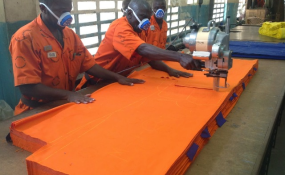By Bernard Lugongo
Tailoring workshops under the Tanzania Prisons Force will undergo a major revitalisation in the next financial year to enable them produce enough uniforms for warders and officers, hence geting rid of private dealers.
In the same vein, the department will procure clothing materials for making uniforms directly from manufacturers instead of purchasing them from the middlemen, according to the Home Affairs Permanent Secretary (PS), Major-General (Retired) Projest Rwegasira.
The new arrangement comes in the wake of an order by President John Magufuli who wanted to see immediate halt to the sale of military uniforms by civilians.
When he made impromptu visit to Ukonga Prison in Dar es Salaam recently, the president condemned the involvement of civilians in making and conducting trade in uniforms, directing all people dealing in military attire to stop it and immediately surrender their consignments to respective forces.
Dr Magufuli issued the order after receiving complaints from prison wardens over the procurement of their uniforms from private dealers, contrary to rules and principles guiding defence and security forces. The president further directed relevant authorities to take to task all those involved in the shoddy deals relating to uniform supply to prison officers.
“In the future, we want to deal directly with the manufacturers of the cloth for making uniforms I have already given a directive on this,” Maj.Gen. Rwegasira told the ‘Daily News’ during an interview at the ministry’s head office in Dar es Salaam.
He admitted that private dealers were involved in the procurement of the uniforms because the current capacity of the industries could not fulfill the demands of the attire for prisons personnel.The prisons have two big sewing industries, one located at Ukonga in Dar es Salaam and the other at Butimba in Mwanza Region.
There are also two smaller factories in Mbeya and Arusha. The industry in Mbeya has 200 sewing machines while Mwanza has also 200, Dar es Salaam – 500 and Arusha – 100.
The PS said the industries were capable of producing enough uniforms, only that they lacked enough materials. “We are now going to increase equipment and manpower to these industries, including fully utilising the prisoners as workers in these factories,” he added.

